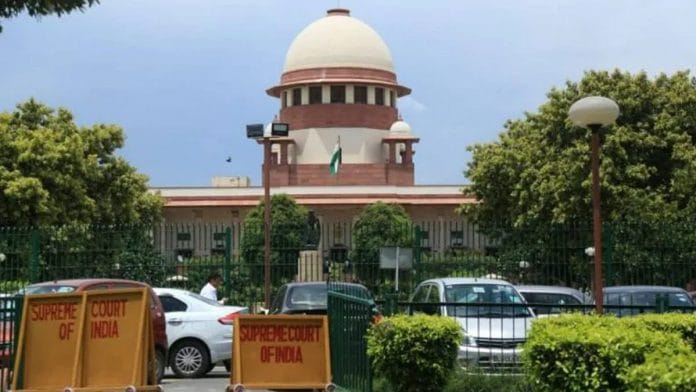New Delhi: Earlier this month, the Supreme Court expanded the definition of a ‘vulnerable witness’ to include for the first time those who record evidence in civil cases — such as family matters — and those heard by Juvenile Justice Boards (JJBs), involving runaway and delinquent juveniles.
This is the second time this year that the apex court has stretched the interpretation of the category.
In January, a bench led by Justice D.Y. Chandrachud issued elaborate guidelines directing the implementation of a Vulnerable Witness Deposition Centre (VWDC) scheme in every high court. To monitor the process, the bench also set up a committee under the supervision of former Jammu & Kashmir High Court Chief Justice, Justice Gita Mittal.
The January order also expanded the definition of a “vulnerable witness” — contained in the Delhi High Court guidelines that are followed by district courts in the Capital to record statements of “vulnerable witnesses”.
It said the definition should include not just those below the age of 18 years, but also sexual assault victims — regardless of their gender — besides those suffering from mental illness, a witness having threat perception, and those who are hearing impaired or have any other disability.
In its latest order, issued on 8 April, the top court has directed that the use of VWDCs should be allowed for other jurisdictions as well. Under the present definition, only a witness deposing in a criminal case is treated as a “vulnerable witness”, subject to meeting the criteria laid down by the top court’s January judgment.
Following this month’s order, those giving testimony in cases of civil jurisdiction can also record their statement under the VWDCs scheme.
“Permission should be granted for recording the evidence of vulnerable witnesses in cases across all jurisdiction,” the court ordered. This means that VWDCs would now be allowed for other jurisdictions, including civil, family courts, juvenile justice boards as well as courts.
The court’s order to include other jurisdictions under the VWDC scheme is based on Justice Mittal’s latest report placed before the bench this month, in which she cited the opinion of health experts, to pitch for the expansion of the VWDC scheme beyond criminal jurisdiction.
“It is important to acknowledge that vulnerable witnesses have an interface with the court system in several jurisdictions,” Justice Mittal’s report mentioned. It further added: “Health experts have opined that the adverse impact of court appearances by vulnerable witnesses remains serious and grave, irrespective of the jurisdiction in which such a witness testifies.”
Also read: Why SC expressed concern over UP court’s tareekh pe tareekh in 30-yr-old arbitration award plea
Guidelines for engaging with vulnerable witnesses
The Justice Mittal committee has also framed model guidelines for the operation of VWDCs in courts and has circulated them to all high courts for their consideration and examination.
The guidelines provide the necessary “framework” to courts, to promote a sensitive response of the justice system towards the vulnerable witness, and enable compliance with the top court’s directions.
The model guidelines allow for a periodic review of their implementation by independent research bodies, or reputed academic institutions and universities, or multi-disciplinary committees constituted for this purpose. They also provide an evolving and dynamic platform for ensuring a level playing field and justice to a vulnerable witness.
Other provisions in the guidelines include the permitting of in-camera proceedings for vulnerable witnesses, providing “comfort items” to such witnesses, and organising a pre-trial court house tour for him or her, to familiarise them with the environment and basic purpose of adjudication and roles of court officials.
The guidelines also identify several factors that shall be considered by the court before it declares a witness vulnerable.
The possible factors — which are likely to cause stress to a witness, who then may not be able to depose properly — include multiple depositions by a witness, not using developmentally appropriate language, anxiety regarding threats from the accused, fear of public exposure, prolonged court proceedings, lack of understanding of complex legal procedures, confusion and guilt about testifying against a family member or relative, worry about being yelled at, ridiculed or getting into trouble for testifying, and inaccessibility of a courtroom.
Assistance of a support person shall be extended to a vulnerable witness, particularly in cases of sexual assault on children, the guidelines state. The support person shall be of the vulnerable witness’s choice. However, the support person shall not be allowed to prompt, sway, influence or tutor the witness, and will only provide emotional support.
The guidelines also cover the manner in which a vulnerable witness can be examined or questioned. To make sure truth is ascertained, the court, according to the guidelines, shall ensure questions are kept simple and stated in a form appropriate to the comprehension and developmental level of the vulnerable witness.
Courts must avoid wastage of time by declining questions which they consider unacceptable or unconnected to the case, or repetitive, or framed in a language too complicated for the witness to understand. In cases involving sexual offences against child victims, the guidelines state that questions should be put to the child victim only through the court.
Video or audio recording of a vulnerable witness should be destroyed, under the rules framed by the respective high court, add the guidelines.
(Edited by Poulomi Banerjee)
Also read: ‘Don’t put film studies in a box’ — SC tells FTII to allow colour-blind students in all courses






